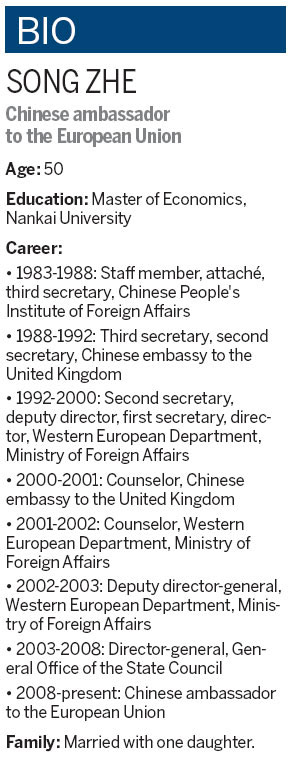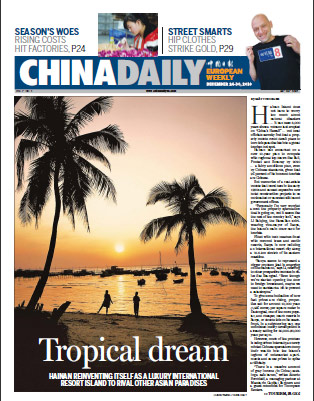'Impressive achievements' cap off China-EU relations
Updated: 2010-12-24 10:39
By Fu Jing (China Daily European Weekly)
In 2009, European enterprises in China earned $341.3 billion in sales. This is 1.4 times of Chinese exports to Europe and 2.7 times European exports to China.
|
 |
During the financial crisis, investment returns in China also became the fundamental support for many European multinationals to stay in the black or simply to stay afloat.
Song cites the story of Volkswagen as a typical example. The Chinese auto market absorbed 14 percent of the company's total global sales but contributed 80 percent of its total profit in 2009.
"What I want to emphasize is that China always supports mutually beneficial and win-win business relations. We will never sacrifice the interest of others for our own good," Song says.
However, misconceptions among the European public toward China remain.
Song still feels there is a "dark cloud" hanging over the prospect of China-EU relations, though he says he is indeed impressed by the sustained and steady progress the two sides have made so far.
"It is unsettling to find that the European public seems to be increasingly interested in the differences and disputes between China and Europe," Song says. "For these problems, competing interests are a factor, but more often than not, I find troubled perceptions the most fundamental cause."
Song attributes the misperceptions among the European public to the differences in history, culture, development stage, and to the social systems and ideologies of China and the EU.
As for development, Song says China still has 150 million people who make less than $1 every day - which is a United Nations benchmark of poverty.
"That's more than the total population of Germany and France combined," Song points out.
Due to harsh natural conditions, a low level of economic development and a fragile ecological environment, many people in the central and western parts of China are living in poverty.
Similarly, more than 10 million Chinese people still do not have access to electricity. And the per capita GDP of Shanghai is eight times that of Guizhou province.
"I think the Chinese people are in the best position to understand the complications of our own challenges and problems," Song says, citing a survey suggesting that 80 percent of Chinese people do not think of China as a strong power.
Song says the two sides should continue to deepen political mutual trust, respect each other's development path and accommodate each other's concerns.
Bilateral relations have gone beyond the bilateral context and in the post-crisis era, stronger strategic cooperation between China and Europe on international issues and closer participation in rule-making and institutional-building is expected to help promote a new world order featuring multilateralism.
Next year, China will begin to implement its 12th Five-Year Plan (2011-2015) and the EU will follow through the EU 2020 Strategy.
"Our similarities and best practices in social and economic development could offer us enormous opportunities to deepen cooperation," Song says.
In the next five years, the Chinese government will also work hard to build an energy-saving and environmentally-friendly society, and efforts will be made to address climate change, conserve resources and protect the environment.
It is estimated that 3 trillion yuan (341 billion euros) will be spent in China for environmental protection between 2011 and 2015, accounting for 1.5 percent of total GDP.
"There is no doubt that Europe's world-renowned clean energy and environment protection companies will find themselves a substantial market in China," Song says.
Paper's Digest

Jingle bells
The younger generation and every king of retailer are embracing the christmas holiday more than ever before across China.
Chinese shoppers boost luxury market
Growing appetite for foreign firms
Happiness quotient
Specials

If you're happy and you know it
Chinese J.K. Rowling's best-selling children's works are rapidly finding a foreign audience

Clothes maketh this man
English entrepreneur pioneers hip streetwear culture and becomes one of the locals in old Beijing.

Ich bin ein Beijinger
German sinologist's lifelong connection with China is deeply rooted.
